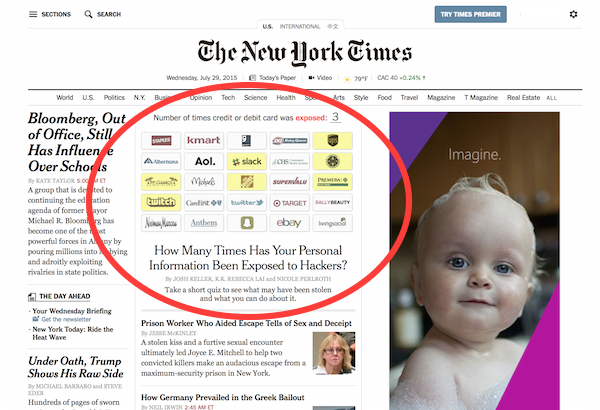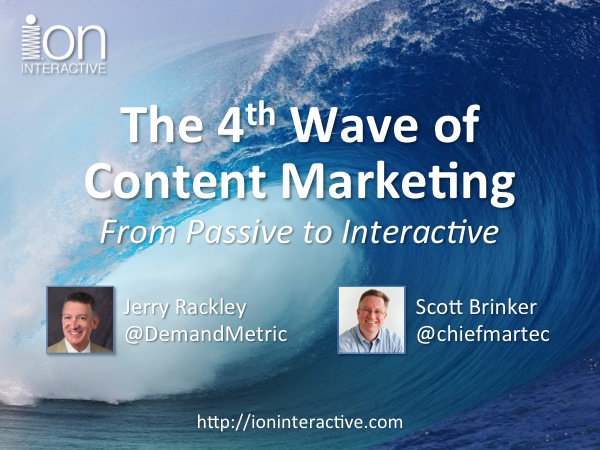As part of my adventure in academia at Harvard to explore new ideas in marketing technology, I’ve been taking a class on the intersection of economics and computer science. It’s an incredibly vibrant research area these days, particularly because online advertising auctions such as Google AdWords have provided a fruitful real-world application for software-driven market mechanism design.
One of the topics that comes up a lot is the objective of making a system “incentive compatible,” or “strategyproof,” such that it’s in the best interest of the participants to be truthful. In the scenario of a keyword auction, that would mean that advertisers would be incentivized to bid their true value for that keyword — and have that truthful bid work out best for them — rather than trying to second-guess their competitors or the auctioneer.
Now, Google AdWords — which uses an auction mechanism known as a Generalized Second Price (GSP) Auction — is known to not be strategyproof. You could argue whether that’s a feature and not a bug. However, like it or not, it is the world in which search marketers must ply their trade today.
Thinking about the dynamics at work there, I started a list of the strategic factors that can influence how people bid on these auctions and thought it would be worth sharing.
First, there’s a whole category of bounded rationality factors:
- don’t understand how the Google auction process works;
- not worth the resources (time, money, computation) to calculate bids accurately;
- don’t necessarily know the true value of a click from a particular keyword;
- emotional bidding, such as “ego bidding” or knee-jerk reactions to competitors;
- value of a bid/click changes dynamically since last time you calculated it;
There’s another category of externality factors, especially surrounding the brand dimension of search marketing:
- value of the impression (even without the click);
- competitive participation in a particular keyword (who’s there, who’s not);
- value of position relative to competitors (leaders, followers, value players);
- interplay with organic results;
- competitor seeking to harm you (or you harm them) with bidding amounts;
- parallel bid on an alternate search engine (e.g., Bing, Yahoo!);
There’s also a category of creative factors:
- the ad creative itself, both in content and visual cadence;
- the influence and interplay of the creative of competitive ads;
- Google checkout button, value of visual distinction;
- use of dynamic keyword insertion;
- value of offer to win the click (i.e., discount or free giveaway);
- interplay with post-click marketing;
And finally a category of optimization factors:
- portfolio optimization, picking bundles of keywords to maximize overall ROI;
- using geo-targeting to optimize bids within selected areas;
- taking advantage of a competitor’s bounded rationality;
- impact of broad match vs. phrase match vs. exact match;
- optimizing and/or leveraging quality score metric;
- click fraud influencing the number of clicks and one’s real net CPC;
I’m sure this list is incomplete, and each of these factors has been beaten to death in better blog posts than mine, but it’s interesting to me to think of the meta-patterns at play here. How good is current software, such as Clickable and Efficient Frontier in weighing these factors in search marketing management?
Are there other factors — or entirely new categories — that you’d add?




Scott – This is a phenomenal post. It exposes a view on search that is almost universally ignored – that the little we know and control is dwarfed by that which we don’t. For every change we make, endless changes we didn’t make are compounding or counter-acting. None of which will show up in the metrics.
Your list is an excellent compendium of major issues for bidding and really PPC in general. Google has created the illusion of a transparent little system. It’s anything but transparent and as your list highlights the impacts on that system come from far beyond the interface itself.
None of the software in the market take the vast majority of these factors into account, and the ones they do are only minimally considered. Paid search advertisers and playing on a decidedly un-level playing field with vastly inadequate tools or information. This post does a great job of helping all of us better realize the scope of the problem.
Thanks, Craig — your comment means a lot to me, since I consider you to be one of the true gurus in PPC dynamics.
I’m sure you and your team at ClickEquations wrestle with these issues every day. I thought that some of your educational materials on quality score in particular highlight the complexity of the “larger game” at work in keyword bidding.
One does have to wonder how greater transparency in auctions such as Google Adwords could improve the situation. Perhaps someday, when competitive pressures come to the search giant, we’ll find out…
Scott – Just wanted to say thank you for a great post. Love how you categorized the factors, which makes them much easier to comprehend in a meaningful way that can be applied to campaigns. Look forward to reading more.
Hi, Justin — thanks for the kind comment! There does seem to be still a lot to learn about PPC optimization out in the wild with these factors that defy simple spreadsheet analysis. An exciting opportunity!
Nice post Scott. S’pose I’ll do Efficient Frontier a little corrective backlink favor, though not sure why — their actual URL is actually efrontier.com. 🙂